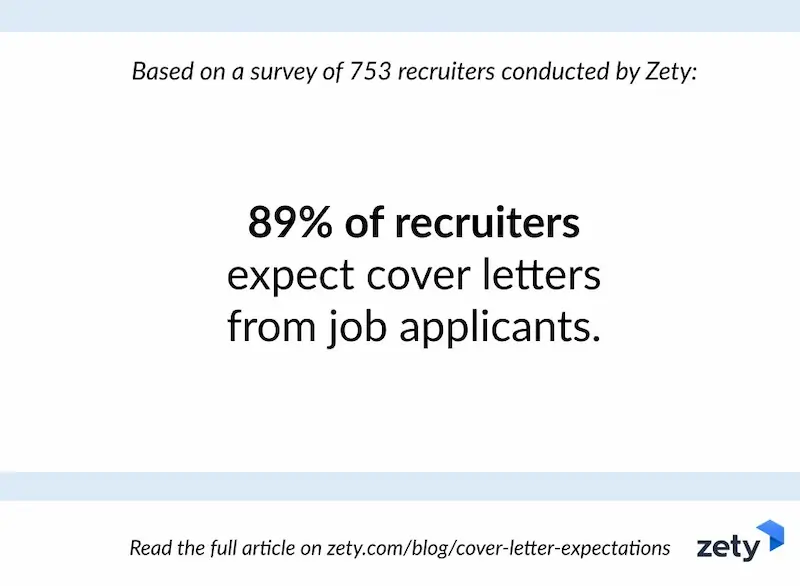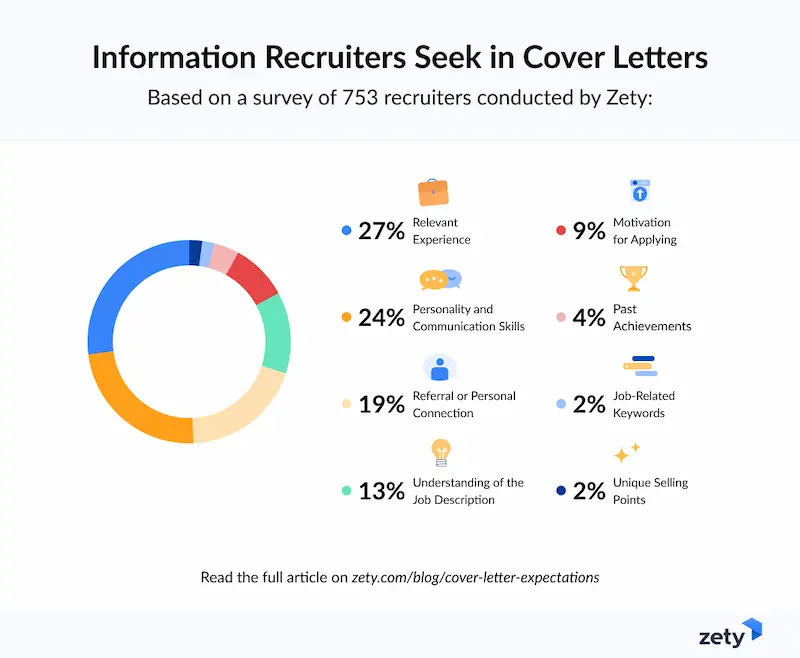Conflicting opinions on cover letters have been around for years. Here’s the truth: the only thing that matters is fitting into the expectations of hiring professionals—they’re the ones who make recruitment decisions. That’s why we decided to ask over 700 recruiters for their opinions on cover letters.
Key Findings:
- Cover letters rule: Over 8 in 10 recruiters read cover letters and make recruitment decisions based on them.
- It’s about experience: Most recruiters prefer reading about a candidate’s relevant experience over their motivation for applying.
- Networking pays off: Almost 1 in 5 recruiters expect to see a referral or a personal connection to the company.
Do Recruiters Want to Receive Cover Letters?
Here’s a tl;dr answer: yes, they do.
No matter the complexity of the recruitment process, a cover letter is still one of the key elements influencing hiring decisions. The results from our survey of 753 recruiters prove that, without a doubt: 89% of hiring professionals expect cover letters from job candidates. Not all recruiters will read your cover letter in full, but as many as 83% will.

The stakes are high, and the cover letter is not a mere formality. Sending a generic one is not a wise career move: 81% of recruiters have rejected applicants based solely on their cover letters. Surely, you don’t want to belong to that group. If you need another incentive, here’s why sending a well-written cover letter pays off: 87% of recruitment professionals say that cover letters are a key factor when deciding who gets the interview invitation.
Will that change when more companies embrace AI tools in recruitment processes? We’ll see. Nowadays, technological advances such as Applicant Tracking Systems help to filter candidates. However, applications from those who passed the ATS screening are still reviewed by humans (phew, what a relief!). That’s why it’s worth knowing what they want from candidates.
What Do Recruiters Expect From Cover Letters?
Understanding that cover letters are mandatory is one thing—writing one that appeals to a recruiter is another. How does a recruiter decide if you’re a good fit for the role? What’s the basis for their opinion? That’s what we wanted to know, so we’ve asked.
According to recruiters, here’s what they seek when reading cover letters:
- Relevant experience: 27% of recruiters want to see how the applicant’s experience connects to the demands of the role.
- Personality and communication: 24% stated that they use cover letters to assess the candidate’s ability to communicate.
- Connection to the company: 19% of recruiters check if the cover letter mentions a referral or other type of personal connection.
- Understanding of the job description: 13% of respondents stated they want to see if the applicant has read the job description carefully.
- Motivation: only 9% of recruiters want to learn about the applicant’s motivation.
- Quantifiable achievements: 4% of respondents take notice of past professional achievements demonstrated through data and metrics.
- Keywords: just 2% of recruiters focus their attention on keywords related to the job posting.
- Unique selling points: 2% read cover letters to spot the candidate’s unique selling point.

Honestly, it didn’t surprise me that less than 1 in 10 recruiters care about the applicant’s motivation. However, seeing how little professional achievements matter to recruiters is astounding. I can only speculate why—perhaps applicants often include irrelevant accomplishments or can’t explain what the metrics stand for.
Bear in mind that recruiters don’t have time to read lengthy bios from candidates. Most of the hiring professionals we’ve interviewed prefer short cover letters. Almost half (49%) think that the perfect length is half a page, 26% consider one page to be perfect, and 25% think that just a few sentences are enough.
Conclusion
In June 2024, our team has interviewed 753 recruiters to find their preferences regarding cover letters and turn them into insight for job seekers. The findings are clear: the vast majority of recruiters expect to get cover letters alongside resumes. They also expect them to be tailored to the position, and quite often, the decision to send an interview invite depends on the cover letter.
Share Your Insights
If you find this data helpful, interesting, or useful, don’t hesitate to share this article on your website and social media. This will help others gain more knowledge about the best practices for cover letter writing. It might also convince someone to start working on their cover letter. Please add a link back to this page so that I can see the impact of this survey.
About Zety’s Editorial Process
Our editorial team has reviewed this article to ensure it aligns with Zety’s guidelines. We are committed to providing reliable, tailored career advice, which brings over a million readers to our site each year. Our team conducts original research to stay updated with the job market and is proud to be cited by top universities and media outlets worldwide.
Sources
- Ore O, Sposato M. Opportunities and risks of artificial intelligence in recruitment and selection. International Journal of Organizational Analysis, 2022 Dec 7;30(6):1771–82
- van Esch, P., Black, J.S. & Arli, D. Job candidates’ reactions to AI-Enabled job application processes. AI Ethics 1, 119–130 (2021)


